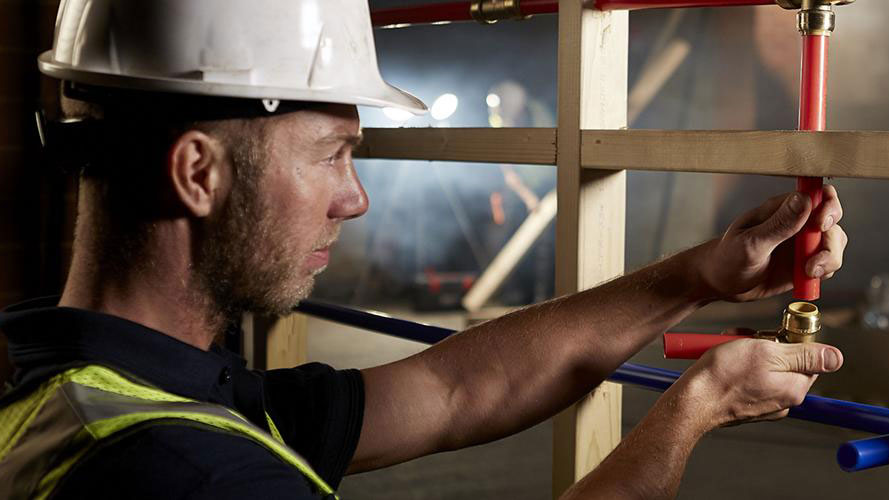It is common for ASX companies to enjoy strong local advantages but lack the same influence in other countries.
Outside Australia, ARB’s high-quality automotive accessories struggle to command the same premium prices. Reece’s Australian specialty stores benefit from economies of scale, but are on the losing side of this dynamic in the US. And then there are the attempts by the big four banks to expand overseas.
At Reliance Worldwide (ASX: RWC) the opposite phenomenon can be observed.
An undisputed category winner
Reliance Worldwide sells plumbing components. Although the company is an Australian company, its SharkBite and John Guest branded connectors are far more popular in the US and UK than in Australia.
In the US, SharkBite has an 85% market share and is synonymous with the push-to-connect category, just as Jacuzzi is synonymous with hot tubs and Tupperware is synonymous with plastic food containers.
It is the only product of its kind offered by two major US home improvement chains, Home Depot and Lowe’s. Reliance was also able to command higher prices from these buyers, a rare feat given the enormous purchasing power of both companies.
In Australia, the situation is different. SharkBite has a market share of just under 20% in the push-to-connect category and no real pricing power.
Building on the success of SharkBite
Reliance’s 2024 results showed revenue of $1.2 billion (flat year-on-year) and adjusted profit down about 3%. The situation would be much worse without the Americas segment, whose profit margins rose about 17%.
According to Esther Holloway, Morningstar analyst for Reliance Worldwide, the company has continued to position its Americas segment for growth over the course of the year. And although America already accounts for around 70% of Reliance’s total revenue, she believes the outlook for this market is quite good.
One reason is that adoption of push-to-connect plumbing fixtures is expected to increase. Holloway sees this primarily in the younger and less experienced plumbing workforce in the U.S., as well as the increase in do-it-yourself jobs informed by blogs and how-to videos.
Thanks to these trends, Holloway believes push-to-connect products can increase their share of the U.S. plumbing fixture category from 15% to 25% over the next decade – a development that SharkBite and Reliance’s other push-to-connect brands could clearly benefit from.
Reliance’s products are trusted because they have been on the market for a long time and there are no major defects. And since the cost of a water leak can be huge to the consumer, Holloway believes most consumers are willing to pay Reliance’s slightly higher prices compared to newer or lesser-known brands.
Reliance is also trying to leverage the brand recognition and buyer relationships it gained through SharkBite to sell complementary products. These new products were mostly acquired through bolt-on acquisitions and include Holman (purchased in 2024), EZFlo (2021), John Guest (2018) and HoldRite (2017).
How much could Reliance be worth?
Overall, Holloway believes Reliance can grow its revenue by an average of 7% over the next decade.
The company’s profit margins are likely to fluctuate due to the cyclical nature of demand for renovation and building products, but Holloway believes underlying margins can improve from around 22% currently to pre-tax levels of 25% at mid-cycle.
Overall, Holloway believes Reliance is worth $5.90 per share. At a current price of $5.10, the shares appear undervalued and have a Morningstar rating of four stars.
More articles on the reporting season:
Get more Morningstar insights in your inbox
Terms used in this article
Star rating: Our one- to five-star ratings are guideposts for a broad audience and everyone must consider their own specific investment objectives, risk tolerance and several other factors. A five-star rating means our analysts believe the current market price is likely to represent an overly pessimistic forecast and that above-average risk-adjusted returns can be expected over a long period of time. A one-star rating means our analysts believe the market is pricing in an overly optimistic forecast, limiting upside potential and exposing the investor to capital loss.
Fair value: Morningstar’s fair value estimate is the result of a detailed forecast of a company’s future cash flows, based on our analysts’ independent primary research. The price-to-fair value ratio measures the current market price compared to the estimated fair value. If a company’s stock is trading at $100 and our analysts believe it is worth $200, the price-to-fair value ratio is 0.5. A price-to-fair value ratio above 1 suggests the stock is overvalued.
Moat Rating: An economic moat is a structural feature that allows a company to generate excess returns over a long period of time. We believe companies with a narrow moat are those that are more likely to generate excess returns for at least a decade. For companies with a wide moat, we believe excess returns will continue for 10 years and probably at least 20 years. For more information on how to identify companies with an economic moat, check out this article by Mark LaMonica.

